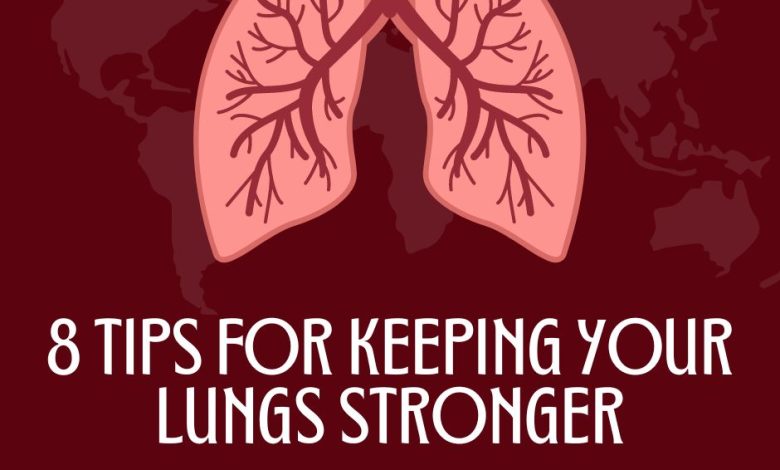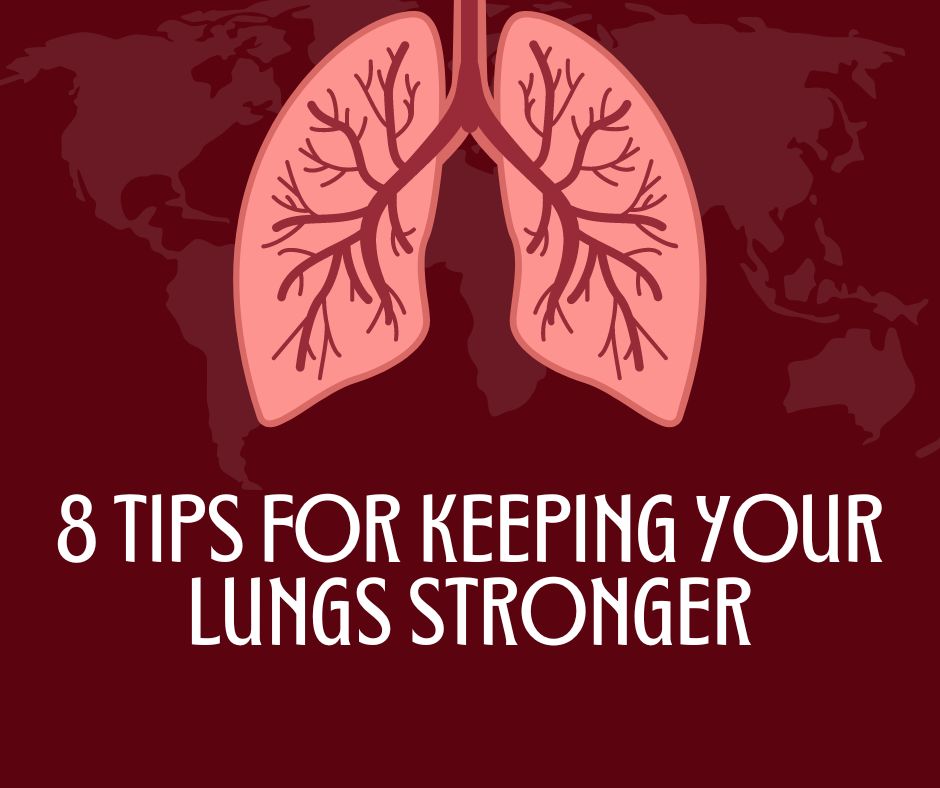Breathe Easy: 8 Tips for Keeping Your Lungs Stronger

Keeping your lungs strong is essential for maintaining good health. With most common lung diseases, such as asthma, COPD, and lung cancer, on the rise, it’s more important than ever to take steps to keep your lungs healthy. In this blog post, we’ll discuss eight tips for keeping your lungs more robust for longer. From regular exercise to reducing exposure to toxins, these simple lifestyle changes can help ensure your lungs stay solid and healthy. So, let’s get started!

Most Common Lung Diseases
Regarding lung health, we must know the Most Common Lung Diseases that can affect us. Conditions such as asthma, COPD, bronchitis, pneumonia, emphysema, and cystic fibrosis are rising, making it crucial to take preventative measures. These diseases can have a significant impact on our breathing and overall well-being. Understanding these conditions’ symptoms, risk factors, and treatment options is essential in maintaining optimal lung health. By knowing about these diseases, we can better protect our lungs and ensure they stay strong and healthy for longer.
Why Lung Health Matters
Maintaining lung health is crucial for overall well-being. The rise in Most Common Lung Diseases like asthma, COPD, bronchitis, pneumonia, emphysema, and cystic fibrosis highlights the importance of prioritizing lung health. These conditions can significantly impact our breathing and quality of life. Taking proactive steps to keep our lungs strong can help prevent and manage these diseases. By understanding these conditions’ risks, symptoms, and treatment options, we can make informed decisions to protect our lungs. Remember, healthy lungs mean better respiratory function and improved overall health. So, let’s dive into these eight tips to keep your lungs strong for longer and breathe easy!
Stop Smoking
Smoking is one of the most harmful habits for your lungs. The chemicals in tobacco smoke can cause inflammation and damage the airways, leading to Most Common Lung Diseases like COPD and lung cancer. To keep your lungs strong and healthy, quitting Smoking is essential. It’s not an easy task, but with determination and support, you can do it. Consider contacting your healthcare provider for resources and strategies to help you quit. Remember, quitting Smoking is the best gift you can give your lungs. Take the first step today and say goodbye to Smoking for good.
Avoid Exposure to Air Pollutants
Exposure to air pollutants can have a significant impact on lung health. It’s essential to be aware of the potential dangers and minimize exposure. Air pollutants, such as vehicle exhaust, industrial emissions, and indoor pollutants, can irritate the airways and contribute to respiratory problems. To avoid exposure, try to limit your time spent outdoors during times of high pollution, use air purifiers in your home, and prevent Smoking or being around secondhand smoke. Additionally, keeping your home well-ventilated and using natural cleaning products can help reduce indoor air pollutants. These precautions can help protect your lungs from harmful impurities and maintain better health.
Exercise Regularly
Regular exercise is not only beneficial for your overall health but also plays a vital role in keeping your lungs strong. Engaging in physical activity helps to improve lung function and increases lung capacity. When you exercise, your breathing becomes more profound and efficient, allowing your lungs to absorb more oxygen and expel waste gases effectively. Aerobic exercises like running, swimming, or cycling are particularly beneficial for strengthening your lungs. Additionally, incorporating strength training exercises can improve respiratory muscle strength. Aim for at least 30 minutes of moderate-intensity exercise most days of the week to reap the full benefits for your lung health. So lace up those sneakers, get moving, and let your lungs breathe easy!
Practice Deep Breathing
Please take a deep breath in and let it out slowly. Deep breathing is a simple yet powerful technique that can help keep your lungs strong. Regularly practising deep breathing exercises can increase your lung capacity, improve respiratory muscle strength, and enhance oxygen exchange. To practice deep breathing:
- Find a quiet and comfortable place to sit or lie down.
- Close your eyes and take a slow, deep breath through your nose, filling your lungs with as much air as possible.
- Exhale slowly through your mouth, releasing any tension or stress.
- Repeat this deep breathing exercise for a few minutes daily, and feel the difference it can make in your lung health.
- So please take a moment, inhale deeply, and let your lungs thank you for it.
Keep Indoor Air Clean
Breathing clean air is essential for maintaining strong and healthy lungs. The quality of indoor air can often be worse than outdoor air, so it’s necessary to take steps to keep it clean. Start by regularly cleaning your home, including vacuuming and dusting to remove allergens and pollutants. Avoid using harsh cleaning products that can release harmful chemicals into the air. Additionally, consider using air purifiers or opening windows to improve ventilation and circulate fresh air. If you have pets, groom them regularly to reduce pet dander. Keeping indoor air clean can create a healthy environment for your lungs to thrive. So let’s prioritise clean air and breathe easy in our homes.
Get Vaccinated
One of the most effective ways to protect your lungs is by getting vaccinated against certain respiratory infections. Vaccinations can help prevent influenza, pneumonia, and whooping cough, which can significantly impact lung health. These infections can lead to severe respiratory complications, especially for individuals with pre-existing lung conditions. By getting vaccinated, you can reduce your risk of developing these infections and their potential long-term effects on your lungs. Consult your healthcare provider to determine which vaccinations are recommended based on age, medical history, and risk factors. Protect your lungs and overall health by getting vaccinated – a simple step that can make a big difference in maintaining strong and healthy lungs.
Eat a Healthy Diet
Maintaining a healthy diet is essential for overall well-being and is significant in keeping your lungs strong. Eating a diet rich in fruits, vegetables, whole grains, lean proteins, and healthy fats can give your body the nutrients it needs to support lung health. Specifically, foods high in antioxidants like berries, leafy greens, and citrus fruits can help reduce lung inflammation and protect against damage. Omega-3 fatty acids found in fish, flaxseeds, and walnuts can also have anti-inflammatory effects on the lungs. Additionally, drinking plenty of water and staying hydrated can help thin mucus and promote clear airways. So, fill your plate with nutritious foods and let your lungs thank you for it.



